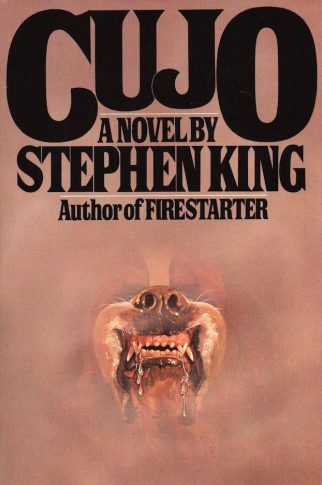 By STEPHEN KING (Viking; 1981)
By STEPHEN KING (Viking; 1981)
The late Chas. Balun once complained that “I’ve read so much horror fiction and most of it just blows. I don’t care about these characters, I don’t care what they had for lunch, what car they drive, or if their uncle drinks too much…” He might well have been referring to CUJO, which carries Stephen King’s well-known penchant for bloat to hellacious extremes. I’ll admit that, contrary to Mr. Balun’s complaints, there’s little in this novel about what its characters have for lunch or their alcoholic uncles, but it does include just about every other extraneous detail you can think of.
The bloat is especially notable here because CUJO’S underlying story is elegantly simple: the titular Saint Bernard contracts rabies after being bitten by an infected bat, transforming the dog into a ravenous killing machine. As such it rips out the throat of its owner, a backwoods redneck who never thought to get Cujo vaccinated, and traps one Donna Trenton and her young son Tad in a broken-down Pinto one sweltering afternoon in what turns into a life-or-death struggle.
It’s a good, relentless story (which incidentally made for a pretty good movie) that would have worked far better at half its current length. As is his wont, King gives us a lot of information on ancillary matters such as the doomed advertising campaign Donna’s husband Vic creates for a children’s’ cereal, which is presented in extremely voluminous detail. This has the effect of showing off the author’s research, but it does nothing for the overall narrative; King evidently found the slogan Vic creates, “Nothing Wrong Here,” so profound he opens the book with it, and uses it as an ironic rejoinder to the horrific events that befall the protagonists, as well as their marriage overall, which appears idyllic but for the fact that Donna has been screwing around with an asshole poet.
The latter character provides King with a further excuse for excess. This guy isn’t merely a promiscuous scumbag but a possible psychopath who leaves obscene notes about what he did to Donna for her husband to find (here King indulges in the age-old cliché of the incriminating birth mark found on a telling portion of the heroine’s anatomy) and trashes Vic and Donna’s house.
Then there are Cujo’s owners, one of whom, the put-upon housefrow Charity, has just won the lottery, and uses the opportunity to leave her abusive hubbie Joe. We get a lot of descriptions of Charity and her son Brett attempting to come to terms with life after Joe, and also Vic, on a business trip in New York, trying to figure out what happened to Donna and Tad—which, given that we know damn well what’s happening with them, only serves to (further) slow things down—as well as a flatulent mailman and some ill-advised supernatural business.
Cujo, it seems, is possessed by the spirit of the evil cop from THE DEAD ZONE, although the device appears to have been included largely to explain how it is that Cujo gets beaten and slammed repeatedly in a car door yet doesn’t die. There’s also a silly bit involving monsters (or something) lurking in Tad’s closet who scare him early on, and later alert Vic to what’s happening, which severely undercuts the novel’s otherwise gritty thrust.
In fairness, Stephen King was in the throes of substance addiction when he wrote CUJO, and has admitted he has no memory of revising it. That’s likely because there were little-to-no revision to speak of, which is a shame, as the stark and claustrophobic descriptions of Donna and Tad trapped in her car with Cujo lurking outside are as strong as anything King has ever written, and the relentless ending, in which a pivotal character meets a most shocking and unexpected death, is a stunner.
